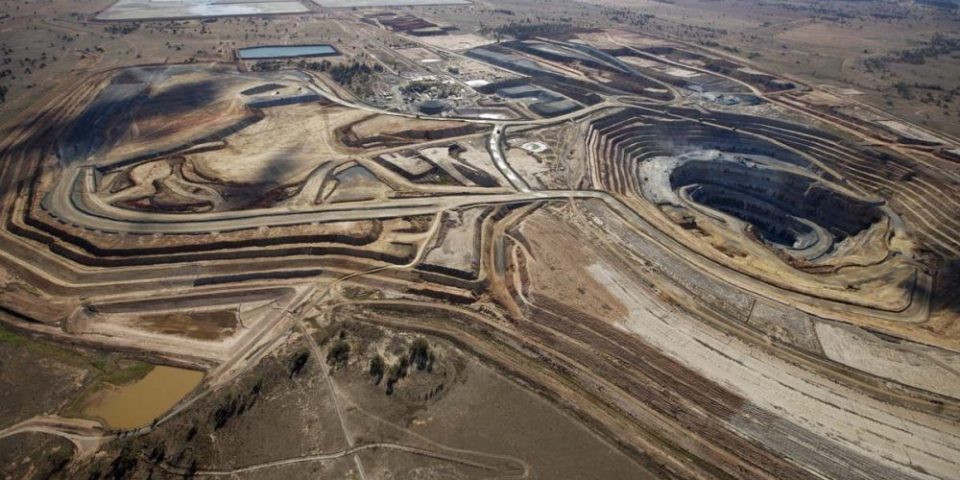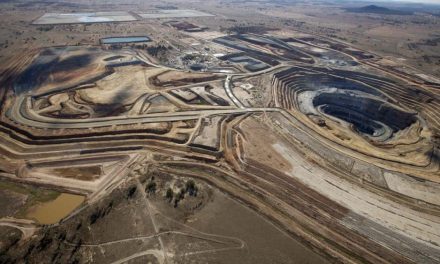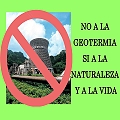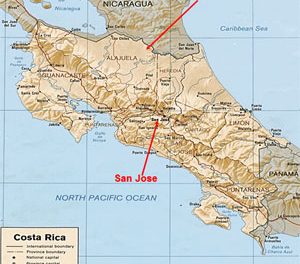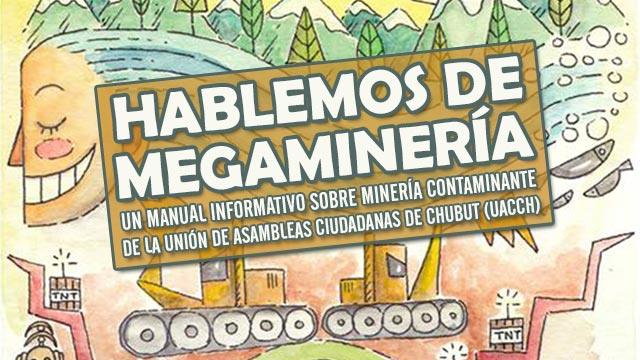Mining firms pay nothing to extract the ore, leaving us to pay billions in cleanup costs. Gifts of jewelry — particularly gold — are a perennial favorite on Santa's list. And with the metal's price hovering near $800 an ounce, the tiniest golden bauble, bangle or bead will be a coveted commodity. But even if you don't elect to splurge on this luxury, it will still cost you plenty because mining companies from around the world can take gold from U.S. lands basically for free, leaving taxpayers with nothing but the cost of cleaning up the damage that mining leaves behind. By Jane Danowitz –
The price of gold
Mining firms pay nothing to extract the ore, leaving us to pay billions in cleanup costs.
By Jane Danowitz – December 11, 2007
Gifts of jewelry — particularly gold — are a perennial favorite on Santa's list. And with the metal's price hovering near $800 an ounce, the tiniest golden bauble, bangle or bead will be a coveted commodity. But even if you don't elect to splurge on this luxury, it will still cost you plenty because mining companies from around the world can take gold from U.S. lands basically for free, leaving taxpayers with nothing but the cost of cleaning up the damage that mining leaves behind.
Although the practice seems naughty, it's all nice and legal because of an obsolete federal law. And although the U.S. House of Representatives recently passed legislation to close the loopholes, the metal mining industry's allies in the Senate may block the long-overdue reforms.
The mining of gold and other hard-rock minerals on public lands is governed by the General Mining Law of 1872, which has remained virtually unchanged since it was signed by President Grant to encourage settlement of the West. The statute was designed to reward pioneers who survived the trek across the frontier with the opportunity to mine gold and other metals freely and in unlimited amounts.
The prospectors are long gone, but the incentives remain. Today, the highly profitable hard-rock mining industry — much of it foreign-owned — continues to receive generous U.S. tax breaks. And it pays virtually nothing for gold and other precious metals it takes from public lands with few restraints. In sharp contrast, oil, gas and coal companies have been reimbursing taxpayers for decades with billions of dollars in royalties that were paid for resources removed from federal property.
Not surprisingly, such free and easy access has resulted in the United States joining the ranks of the world's top producers of gold, most of which ends up as jewelry. And despite its escalating cost, world demand is soaring. The United States now imports less gold than it sends overseas, predominantly to eager consumers in India, China and the Middle East.
The gold may be exported, but the mess made stays behind. The production of just one gold ring generates about 20 tons of waste, according to one mining policy organization, much of it left to litter the landscape as well as polluting rivers and streams. Today, most gold is mined from open pits, which can run a mile long and equally as deep. Utah's Bingham Canyon, which produces gold as well as copper, silver and molybdenum, forms a crater large enough to be visible from outer space.
Moreover, once the ore has been excavated, mining companies separate the gold from the rock with cyanide — a substance so toxic that voters in Montana have outlawed its use in outdoor chemical processing. According to the Environmental Protection Agency, taxpayers face a bill of more than $50 billion to clean up the waste and water contamination that gold and other hard-rock mining has left behind.
It's about to get worse. Driven by record demand and a weak U.S. dollar, investors and speculators are snatching up mining claims at an alarming rate. A recent analysis of government data by the nonpartisan Environmental Working Group found that, in the last five years, there has been an 80% increase in the number of new mining claims in 12 Western states, many within a stone's throw of Grand Canyon, Yosemite and other national parks.
A solution may finally be at hand. The House recently passed bipartisan legislation that would establish royalty payments and set up long-overdue environmental standards for operations and cleanup, as well as provide special protection for parks, wild and scenic river corridors, and national forest roadless areas. The measure faces a tougher test in the Senate, where its important environmental and taxpayer protections could get watered down by mining industry allies.
Mining is an important part of the nation's economy. But it must be regulated by modern law — one that protects the environment and the taxpayers. Considering the billions of dollars of precious metals the hard-rock mining industry has been given without charge, it's time for Congress to stop playing Santa for a few companies and start thinking about leaving a little something for the taxpayers who have been footing the bills.
Jane Danowitz directs the Pew Charitable Trusts' Campaign for Responsible Mining.
El precio del oro.
Las mineras no pagan nada extraer el mineral, dejándo miles de millones de dólares en costos de limpieza.
Jane Danowitz – Diciembre 11 de 2007.
Las compañías de explotación minera alrededor del mundo pueden tomar el oro de las tierras de ESTADOS UNIDOS précticamente en forma libre, dejando a los contribuyentes sin nada, e inlcuso con un costo de limpieza ambiental enorme. Esto se debe a una ley federal obsoleta. Y aunque la cámara de representantantes de ESTADOS UNIDOS aprobó recientemente una legislación para cerrar modificar esta vieja ley, la industria de explotación minera está tratando de bloquear las reformas en el senado.
La explotación minera del oro y de otros minerales en tierras públicas es legislada por una la ley general de 1872, que ha permanecido virtualmente sin cambiar desde que fue firmada por el presidente Grant para animar el poblamiento del oeste. Esta norma fue diseñada para recompensar a los pioneros que sobrevivieron el emigrar a través de la frontera.
Sin embargo hoy, la industria de explotación minera es altamente provechosa. Prácticamente no paga ningún impuesto por extraer oro y otros metales preciosos que toma de las tierras públicas, en franco contraste con las compañías petroleras, gasíferas y del carbón, que han estado reembolsando a los contribuyentes por décadas con mil millones de dólares a travás del pago de los derechos de explotación de los recursos.
Asombrosamente, el fácil y libre acceso a la explotación de oro y otros metales ha instalar a EEUU como uno de los mayores productores de oro del mundo. A pesar del coste de explotación la demanda de oro del mundo es altísima. Los Estados Unidos ahora importan menos oro que los que exportan. Las exportaciones son predominantemente a los consumidores de la India, China y el Oriente Medio.
La producción de apenas un anillo del oro genera cerca de 20 toneladas de basura. Esta basura implica destrucción del paisaje, la contaminación de los ríos y lagos. Hoy, la mayoría del oro se explota a cielo abierto. Por otra parte, una vez que se extrae el minera las mineras separan el oro de la roca con el cianuro — una sustancia tan tóxica que los votantes en el Estado de Montana han prohibido por ley.
Según la agencia de protección del medio ambiente de EEUU los contribuyentes hacen frente a un gasto de mas de $ 50 mil millones de dólares para limpiar la contaminación de la basura que deja la explotación minera del oro.
Dirigido por la fuerte demanda y la debilidad del dólar las compàñías mineras aumentaron sus solicitudes de exploración de oro y metales. Un análisis reciente del gobierno encontró que, en los últimos cinco años ha habido un aumento del 80% en el número de las nuevas solicitudes de explotación minera en 12 estados occidentales, muchos en parques nacionales.
Recientemente la cámara de representantes aprobó una legislación que, de aprobarse en el senado, establecería pagos de los derechos de explotación a las mineras, como también mayores estándares ambientales para las operaciones y garantías para la limpieza al cierre de la mina. También proporciona una protección especial para los parques, reservas, ríos, y áreas del bosque.
La medida debe hacer frente a una dura campaña desde las mineras en el senado.
La explotación minera es una parte importante de la economía de la nación. Pero debe ser regulada por la ley moderna — una que proteja al ambiente y a los contribuyentes.
En vista de los miles de millones de los dólares que dejan los metales preciosos a las industrias de explotación minera, es hora que el congreso de EEUU deje de jugar a ser Santa Claus para algunas compañías y comience a pensar que esta actividad debe dejar algo para los contribuyentes.
Jane Danowitz dirige la campaña para la explotación minera responsable.

